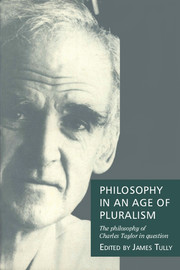Book contents
- Frontmatter
- Contents
- Notes on the contributors
- Preface
- Acknowledgements
- Introduction
- Part I Foundations
- Part II Interpreting modernity
- Part III Natural and human sciences
- Part IV Philosophy in practice
- Part V Ethics, politics and pluralism
- 10 Rights and pluralism
- 11 The political theory of strong evaluation
- 12 Philosophy and political judgement in a multinational federation
- Part VI Reply and re-articulation
- Bibliography of the works of Charles Taylor
- Index
10 - Rights and pluralism
Published online by Cambridge University Press: 05 June 2012
- Frontmatter
- Contents
- Notes on the contributors
- Preface
- Acknowledgements
- Introduction
- Part I Foundations
- Part II Interpreting modernity
- Part III Natural and human sciences
- Part IV Philosophy in practice
- Part V Ethics, politics and pluralism
- 10 Rights and pluralism
- 11 The political theory of strong evaluation
- 12 Philosophy and political judgement in a multinational federation
- Part VI Reply and re-articulation
- Bibliography of the works of Charles Taylor
- Index
Summary
The modern rights-bearing subject has been one of the principal examples for Charles Taylor of the modern self, the exploration of which has preoccupied him for the last fifteen years. In section 1.3 of Sources of the self, a section which contains in many ways the germ of the whole book, he observed that the modern moral world is significantly different from that of previous civilisations: all cultures have had some sense that human beings command our respect, but ‘what is peculiar to the modern West among each higher civilization is that its favoured formulation for this principle of respect has come to be in terms of rights’. But section 1.3 provides merely a brief sketch of what Taylor takes rights theories in general to be claiming; in many ways, the Vorarbeiten of the book, and in particular the articles which he published at the beginning of the last decade, give us a clearer idea of the assumptions governing Sources of the self. So in what follows, I shall draw as much on those articles (where relevant) as on the book.
- Type
- Chapter
- Information
- Philosophy in an Age of PluralismThe Philosophy of Charles Taylor in Question, pp. 159 - 170Publisher: Cambridge University PressPrint publication year: 1994
- 3
- Cited by



